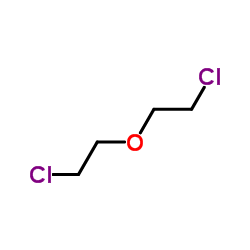Thiodiglycolic acid: a major metabolite of bis(2-chloroethyl)ether.
R D Lingg, W H Kaylor, S M Pyle, R G Tardiff, Robert D. Lingg, William H. Kaylor, Steven M. Pyle, Robert G. Tardiff
文献索引:Toxicol. Appl. Pharmacol. 47(1) , 23-34, (1979)
全文:HTML全文
摘要
Male rats were given a single oral dose (40 mg/kg) of bis(2-chloroethyl)ether (BCEE). Less than 2% of the dose was recovered from the expired air as the unaltered parent compound during an 8-hr collection period. Urine samples representing 48 hr of collection were analyzed by gas chromatography-mass spectrometry. Methyl ester/trimethylsilyl ether derivatives of the isolated urinary acid fraction were prepared for gas-phase analysis. Two metabolites were identified in this fraction: thiodiglycolic acid (TDGA) and 2-chloroethyl β- d-glucosiduronic acid. Quantitative analysis for TDGA gave an average (seven rats) yield for 48 hr of 33 ± 11.8 mg (± SD) of TDGA/kg from a single dose of 40 mg/kg BCEE. The glucuronide of 2-chloroethanol was synthesized using rabbit liver microsomes in an incubation mixture. The matching mass spectrum of the glucuronide prepared in vitro to that identified in the urine of the rats verified 2-chloroethyl β- d-glucosiduronic acid as a metabolite of BCEE.
相关化合物
| 结构式 | 名称/CAS号 | 分子式 | 全部文献 |
|---|---|---|---|
 |
二氯乙基醚
CAS:111-44-4 |
C4H8Cl2O |
|
Carcinogenicity tests of certain environmental and industria...
1981-07-01 [J. Natl. Cancer Inst. 67(1) , 75-88, (1981)] |
|
Bis(2-chloroethyl)ether.
1999-01-01 [IARC Monogr. Eval. Carcinog. Risks Hum. 71 Pt 3 , 1265-9, (1999)] |
|
[Medical topics: bischloromethyl ether and lung cancer].
1985-12-01 [Kango. 37(14) , 82, (1985)] |
|
Treatment of persistent organic compounds by integrated adva...
2009-01-01 [Water Res. 43(16) , 3910-21, (2009)] |
|
Chemical mutagenesis testing in Drosophila. IX. Results of 5...
1994-01-01 [Environ. Mol. Mutagen. 23(1) , 51-63, (1994)] |